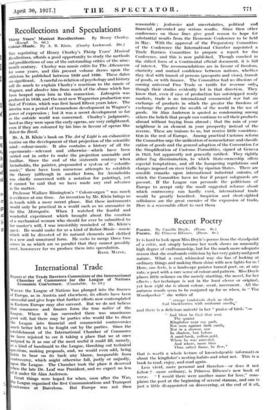International Trade
Report of the Trade Barriers Committee of the International Chamber of Commerce for the League of Nations Economic Conference. (Constable. Is. 3d.)
WHERE the League of Nations has plunged into the finance of Europe, as in Austria and elsewhere, its efforts have been successful and give hope that further efforts now contemplated in Eastern Europe may also succeed. But we do not believe that commerce and finance form the true métier of the League. Where it has succeeded there was unanimous good will, but there may be parties who would like to draw the League into financial and commercial controversies mach better left to be fought out by the parties. Since the establishment of the International Chamber of Commerce We have rejoiced to see it taking a place that we at once assigned to it as one of the most Useful it could fill, namely, as a kind of handmaid to the League, threshing out technical queAlons, making proposals, and, we would even add, being liable to bear on its back any blame, inseparable from oontroversy--,
which might otherwise fall, justly or unjustly, Upon the League. The Chamber took the place it deserved When the late Dr. Leaf was President, and we expect no less if it under Sir Alan Anderson.
Great things were hoped for when, soon after the War, 11)e League organized the first Communications and Transport Coaference• at Dame. lona. But Europe was not then reasonable ; jealousies and uncertainties, political and financial, prevented any serious results. Since then other conferences on those lines give good reason to hope for substantial results from the Economic Conference to be held in May. With the approval of the Preparatory Committee of the Conference the International Chamber appointed a Trade Barriers Committee to prepare a report for the Conference, and this is now published. Though couched in the stilted form of a Continental official document, it is full of interest. The recommendations are in favour of freedom, elasticity and mutual confidence between nations, whether they deal with transit of persons (passports and visas), transit of goods, or with finance. The Committee had no illusions of coming universal Free Trade or tariffs for revenue only,' though their studies evidently led in that direction. They know that, even if ease of production has outstripped ready markets, trade is no international commercial war but an exchange of products in which the greater the freedom of exchange the greater the wealth of the world in the use of goods. Sir Alan Anderson is quoted as condemning among others the beliefs that people can continue to sell their products abroad without buying from abroad ; that the ruin of your neighbour is an element in your prosperity instead of the reverse. These are truisms to us, but receive little considera- tion in the rest of Europe. Among practical Customs reform the Committee urge the unification of nomenclature and classifi- cation of goods and the general adoption of the Convention far the Simplification of Customs Formalities, signed at Geneva in 1923, but apparently not generally ratified. They rightly abhor flag discrimination, to which State-ownership offers especial temptations, and all the hampering regulations and charges imposed on river traffic by riparian States. There are sensible remarks upon international industrial ententes, of which the C,onunittee have no fear if proper safeguards arc present. If the League can persuade the politicians of Europe to accept only the small suggested reforms about which controversy can hardly exist, international trade would be greatly benefited. Suspicion and short-sighted selfishness are the great enemies of the expansion of trade. Here is a reasonable effort to oust them.










































 Previous page
Previous page